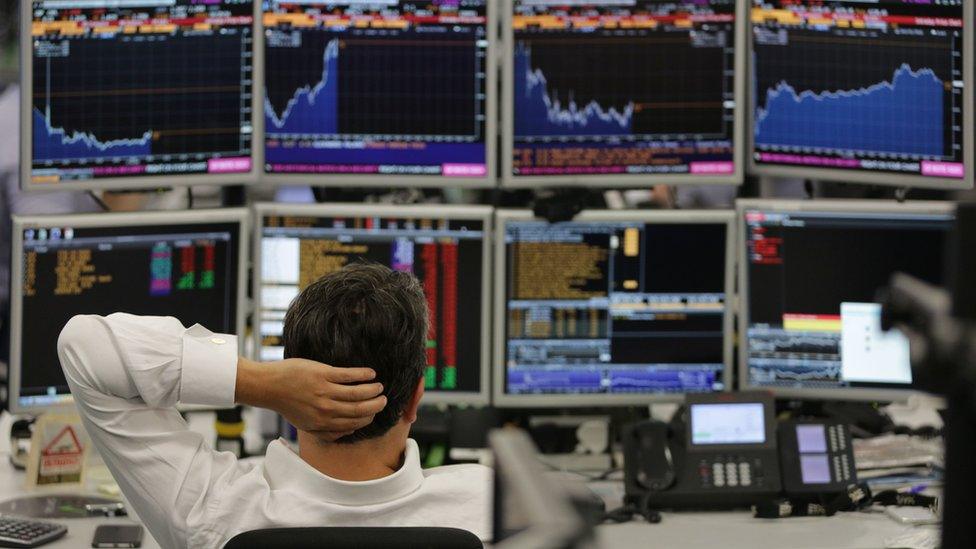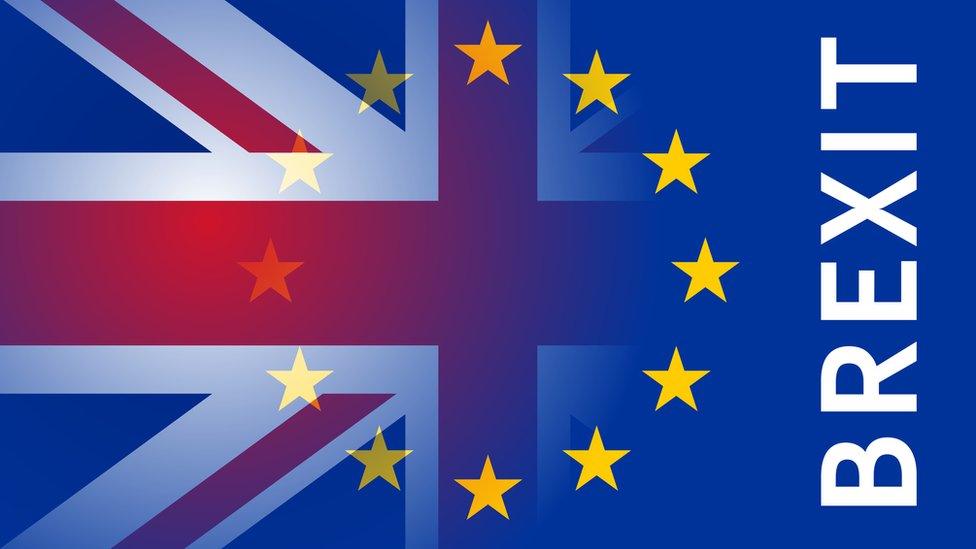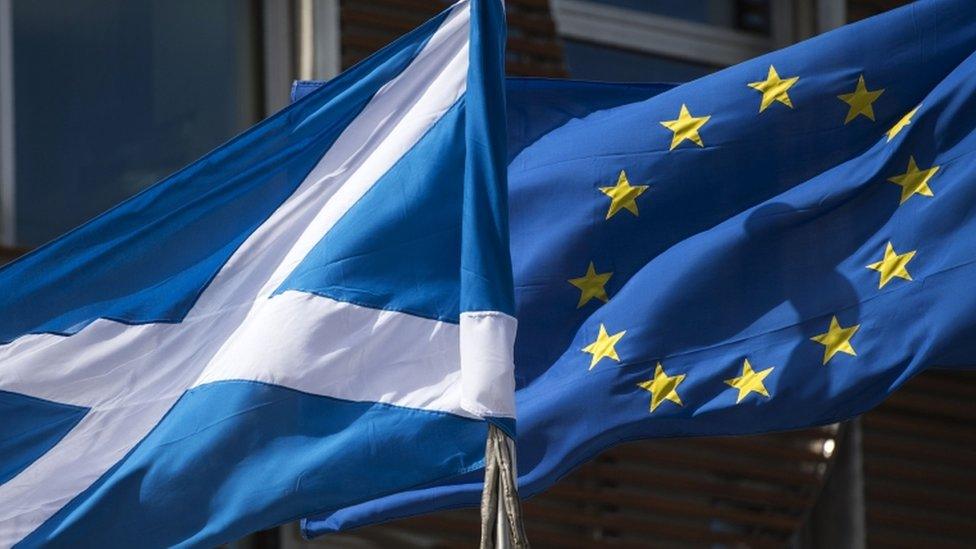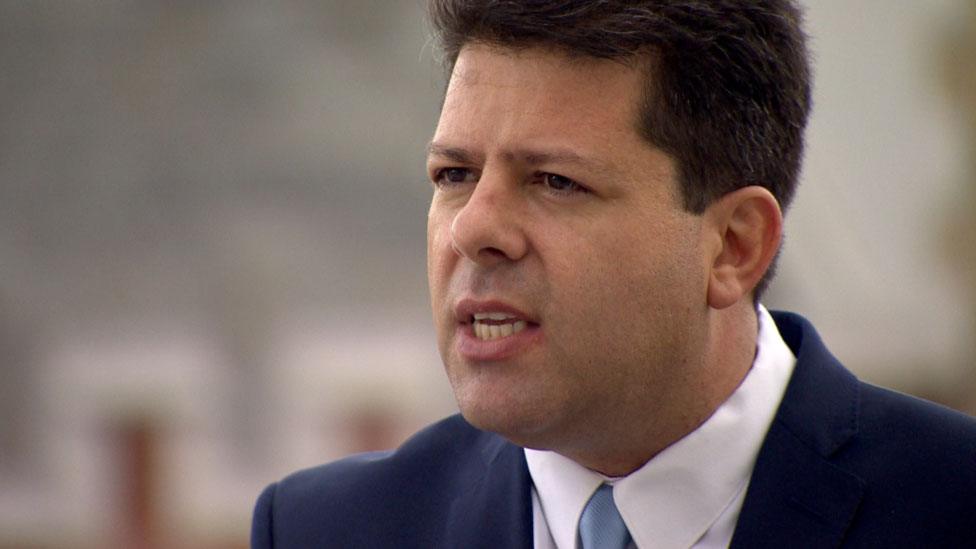Brexit upheaval: structural damage and development potential
- Published

The markets may have found a floor, for now. Some traders have picked themselves off it.
The FTSE 100 index is back where it was before the Brexit result. But many within that corporate elite are global companies. And this was far from being an even recovery.
Two thirds of stocks were down on the week, one in three down by more than 10%, and one in seven by more than 20%.
The top 250 index is more representative of the companies operating in UK markets. It was also up more than 3% in Wednesday trading, but it's got a long way to get back to where it was a week before.
The pound was up against the dollar, but few think it will return to its pre-referendum levels any time soon. That's a relief to some, as the boost that could come from cheaper export prices is about the only cheer for the exporting sector this week.

On the flipside of that, French car manufacturers are already reported to be mulling over the possibility of putting up prices for UK sales.
UK exporters, including the tourism sector, can see an opportunity. But they can also see a big risk if Europe's single market isn't open to them.
So the trade bodies are setting out their priorities for the negotiations ahead, even if the UK government is not.
To take only one day, motor manufacturers and traders pointed to £72bn of turnover last year, and 169,000 manufacturing jobs in Britain. It says recent success is explained by access to Europe's open market and to imported skills.
The technology industry body TechUK, wants to see an open market, open recruitment from abroad, with foreigners made to feel welcome and valued. It wants a review of data protection law, to ensure Britain remains compliant with its neighbours, and a re-write of the UK government's digital strategy, before it's even published.
Scottish Renewables was also warning on Wednesday that the double whammy of Brexit uncertainty and a lack of clarity about green energy subsidies is leaving its members feeling "incredibly fragile".
The call from there is for both Westminster and Holyrood governments to provide leadership, with a strong hint that another referendum in Scotland would not be helpful to the investment case.
Spreading gloom
After the downgrade last Friday to the UK government's credit rating, Moody's has continued to spread the gloom. You'll recall the other two big credit rating agencies, Standard & Poor and Fitch, both followed Moody's into a downgrade or at least a negative watch.
Twelve banks and building societies have been shifted from stable to negative watch by Moody's. That's the prelude to a downgrade.
That red flag warning has extended to 52 'sub-sovereign' issuers of bonds. They are dependent on the UK government for guarantees or funding: six universities, four councils from Cornwall to Lancashire, housing associations, and the fund that underwrites lending to the private rented housing sector. If they are downgraded, their borrowing costs are likely to go up.

Financial analysts are offering their tuppence-worth too.
* Fathom Consulting said last Friday morning that voters had bought "a pig in a poke". That was before it became clear that nothing will be made clear for months, and perhaps years.
That's why Fathom's economists now reckon on "substantially slower growth", with a further interest rate cut which will be "largely futile", followed by more money creation (quantitative easing).
Even if the Brexit vote were to be overturned, they say Britain faces years of "disruption and uncertainty - the damage has already been done".
* Oxford Economics says the market reaction has been overdone. That's global markets - not the UK ones. Its UK growth forecast for 2017 and 2018 has been cut from 2.2-2.3% to only 1.4% per year.
And with other factors, it now says there's a significant risk of global economic growth falling below 2% - "not a recession, but it might feel like one".
* Asset managers in real estate have booked a reduction to the valuations of those portfolios, following the referendum result. With confidence down and uncertainty a feature of the market, they expect property prices to fall, and far fewer transactions.
Opportunities
Other opinions are available. Prudential asset managers say there's always an investment opportunity somewhere, even when markets are tanking. But they're not saying where they think it is.
* Toscafund asset management is chaired by Sir George Matheson, former chief executive and chairman of Royal Bank of Scotland. Its chief economist was among those to recommend a 'leave' vote.
His latest note to clients is a reminder to those who weren't around in 1992 when the pound crashed out the Exchange Rate Mechanism (the forerunner of the euro).
The sharp devaluation helped British industry and services become instantly more competitive, and over time, they got back to robust growth. That bit of history, it is suggested, could repeat itself.
Trade talks
Among those fastest to announce that they're preparing for their own Brexit from London were the global American banks, keen to reassure shareholders and customers internationally that they will do what it takes to stay in the single market.
They're not at all reassuring about what lies ahead. From JP Morgan, theres's a list of obstacles for the UK government, as it predicts a break from the EU delayed until 2019; some progress in exit talks but negligible progress in shaping the future EU-UK relationship; delay in trade deals with non-EU countries until the EU talks are concluded: Britain's need for quick trade deals meaning they won't be advantageous to Britain.
The Wall Street bank expects to see, over the next three years, "multinational operations shifting the location of their activity out of the UK, given the regulatory uncertainties. Financial services are among the sectors that will be most exposed to this".
There's also a bold prediction about Scotland, also from JP Morgan's London-based chief analyst: "Intersecting the UK's EU exit process is likely to be pressure to hold a new referendum on Scottish independence, which we expect will ultimately generate a vote shortly before the UK leaves the EU in 2019. Our base case is that Scotland will vote for independence and institute a new currency at that point."

Yes, that brings us to the position in Scotland. These financiers and economists have no special insight into what Scottish voters will do if asked to vote again.
But having been surprised at the 45% backing for independence, and the rhetoric from Nicola Sturgeon, they are assuming that the next referendum will get the 'yes' vote over the line.
(Whether it remains a positive 'Yes' campaign or is required to become a less loaded 'Leave' one is an interesting question for the Electoral Commission.)
I've noted in recent days that if there is another independence referendum, the nationalist case would be helped in at least one way - it would not face the significant barrier of challenging the status quo and being relatively risky.
That's because there is no status quo any more, and the course on which the UK is now embarked looks economically very risky.
Britain may also face greater fiscal problems, if slowed growth derails Conservative plans to get the government deficit down to a surplus by the next Westminster election.
But Scotland's fiscal challenges, if independent, remain very much larger. That risk hasn't gone away.
Manageable, but not easy
The economist John McLaren, formerly at Glasgow University and at the Scottish government, has been looking again at the numbers, and reckons that £9bn looks like the scale of the Scottish deficit in 2019, at a time when George Osborne hopes to be back in surplus.
With the deficit at around 5% of total national output, McLaren thinks that could be "manageable, but not an easy place to be". He offers some suggestions on how it could be handled; a 3 pence increase in basic rate income tax, and 5 pence on high earners, plus an 80% cut in defence spending, and a bit of extra borrowing.
Those choices would have to be addressed in a second independence referendum.
So too would the choice of currency. The pound has the appeal of being the currency in which Scottish business sells a lot more to the rest of the UK than it sells to the rest of the world.
But the euro could become both more attractive than a) it has been and b) than the pound post-Brexit, and its adoption could be a condition of Scottish membership of the European Union.
So Dr McLaren offers up the economic question underlying another referendum: would Scotland be better off in the EU and not the UK, or in the UK and not the EU?
Certainty, with menace
His answer is strikingly despondent, in that he has learned true believers on the various sides of any referendum or election campaign aren't that interested in economists' answers to such questions at least where they fail to support the cause.
Yet there might be a role for such expertise, if the 'experts' have learned how to explain risk, possibility and probability, making it clear which numbers can be trusted, and to what extent.
The Chancellor, George Osborne, has shown in two referendums that certainty about forecast numbers, while bludgeoning people with menacing economic analysis, can easily backfire.
Voters have also learned from the European Union referendum that:
* They should be sceptical about reassurances of everything turning out all right on the night.
* Labelling your opponents' campaign as 'Project Fear' doesn't mean its forecasts and warnings are wrong.
* The other side in future negotiations are not always going to do what you want them to, or other voters to behave the way you expect.
* And a lesson for the campaign combatants: be prepared for defeat, but just in case you win, it might be wise to have a plan.
- Published27 June 2016

- Published27 June 2016
